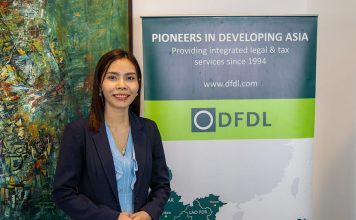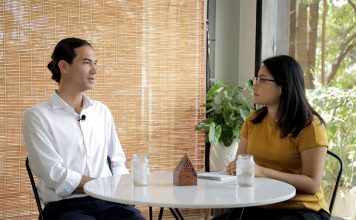
Obtaining Cambodian citizenship may not have crossed your mind just yet, but becoming a national of the Kingdom of Wonder does have its advantages. We look at how you can obtain Cambodian citizenship.
Whether it’s the comfort of not having to secure a visa to enter Cambodia ever again to be able to purchase property and land in your name, applying for citizenship might be worthwhile if your plans in the Kingdom extend beyond a short term work contract.
Some of the most notable personalities to have been granted Cambodian citizenship include:
- Hollywood superstar Angelina Jolie.
- Olympic marathoner Kuniaki Takizaki, who is better known in his native Japan by his comedy stage name Neko Hiroshi.
- British national, Matthew Robinson, a well-known television and film producer.
While Jolie holds dual citizenship, Hiroshi had to give up his original nationality in order to become naturalised here, as Japan does not permit dual nationality.

Applications for Cambodian citizenship are processed by the Ministry of Interior, and the process generally takes two to three months. Cambodia has permitted dual citizenship since 1996, so whether or not you are allowed to remain a citizen of your home country and have dual nationality depends on the laws there.
If the Kingdom has stolen your heart to the point that you feel further assimilation feels right (or if it simply makes good business sense), there are a number of ways a foreigner can gain citizenship.
Updated June 2020.
Benefits of having Cambodian citizenship
Cambodia is one of the only Asian countries that offer citizenship by investment programme.
Successfully obtaining a Cambodian Passport offers visa-free access to ASEAN and 54 different countries, including Thailand, Singapore, Vietnam and Malaysia.
Once citizenship is granted, a foreigner will also be able to own land and property in their own name in Cambodia. You are also eligible to apply for government concessions and licenses that are only available to Cambodian nationals.
The long route – citizenship by naturalisation
Naturalisation is the standard alternative for foreigners wishing to become a Cambodian citizen. You will need to have lived in the country for at least seven years with a residence card. On top of being able to speak and write fluently in Khmer, you will also need to have brushed up on your knowledge of Cambodian history. You will have to sit through an exam to prove your proficiency in these areas.
You must also obtain a certification of good behaviour and moral conduct by the chief of your commune or quarter, and you need to be in possession of an unblemished criminal record (you will be disqualified if you have committed any criminal offence). Your application must be lodged while currently residing in the Kingdom.
The VIP option – Cambodian citizenship by investment or donation
Also known as honourary citizenship, this option is usually the subject of some discussion. Officially, an investment of at least 1.25 billion riel ($312,500) in Cambodia or a donation of 1 billion riel or more to the national budget will allow you to bypass the seven-year residence requirement mentioned in the section above. However, you still need to meet the other requirements, including demonstrating fluency in the language.
Sources consulted by B2B, however, claim that when an investment or a donation of the amounts mentioned above is committed, the citizenship is automatically granted to the investor or donor, whether or not they meet the requirements outlined in the previous section. B2B cannot currently confirm nor deny this possibility.
In June 2018, it was reported that the investment requirement was being raised from at least 1.25 billion riel (about $312,000) in a government-approved project, to nearly $1 million but this was only in a draft stage.
Those that have contributed notably to the well-being and development of the country in other ways, such as through exceptional social work, are in theory also eligible for honorary citizenship.
Between 2015-2018, 1,050 foreigners obtained Khmer citizenship through investment. The Khmer Times reported in 2018 that Chinese and South Korean investors are said to be the most common recipients of Cambodian passports.
To become a Cambodian citizen through donation can take between 3-6 months and there are a number of requirements including:
- Applicant must be 18 years of age or older
- Applicant must have a current and valid passport
- Applicant must have a current valid visa for entry into Cambodia
- Applicant must be of sound mind
- Applicant must be in good health
- Applicant must have made a qualifying investment in Cambodia of at least 1.25 billion riel (USD $311,000)
The love path – citizenship by marriage
For foreigners who came to Cambodia, fell in love, married, had kids, citizenship by marriage is possible. Fortunately, those bound in legal holy matrimony are a step closer to Cambodian citizenship.
If you marry a Khmer spouse, you may apply for citizenship after three years of living together, providing the marriage has been properly registered.
Cambodian citizenship by birth and descent
Regardless of the place of birth, those born to at least one Khmer parent are entitled to Cambodian citizenship. Meanwhile, those born in the Kingdom to foreign parents who were born and living legally in Cambodia also acquire Khmer citizenship at birth.
In June 2020, it was also announced that a working group was drafting a bill to replace the existing immigration law in Cambodia. Sar Kheng said the immigration law was written in 1994 and many changes have been made to it over the years, and Cambodia just revised the law on nationality. “The law on immigration has been changed a lot, so we must form a committee to prepare a proposal to re-arrange the law,” he told the Phnom Penh Post.
Changes could be made to determine the rules and conditions that apply to foreigners entering, passing through and staying in the Kingdom.








